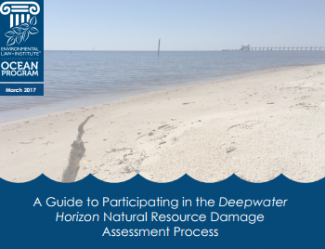Reducing Overfishing Through Traceability

A review of the potential for seafood traceability systems to reduce illegal catch and mislabeling.

A review of the potential for seafood traceability systems to reduce illegal catch and mislabeling.
In April 2016, a federal court approved a settlement among the United States, five Gulf states, and BP. This settlement resolved all of the federal and state governments’ remaining claims against BP related to the Deepwater Horizon (DWH) oil spill. Under the terms of that settlement, billions of dollars will flow to the Gulf for restoration and recovery over the coming decades. This includes up to $8.8 billion that will be distributed through the natural resource damage assessment (NRDA) process, and $4.4 billion that will distributed through the RESTORE Act.

When an oil spill occurs, natural resources like fish, birds, and marshes may be injured. A natural resource damage assessment (NRDA) is a process focused on figuring out what those injuries are, coming up with a plan to fix those injuries, and then fixing them. This document is intended to help guide you as you determine how to engage in the Deepwater Horizon NRDA process. Following some brief background, the document is divided into two parts.

